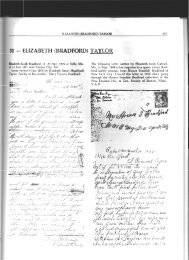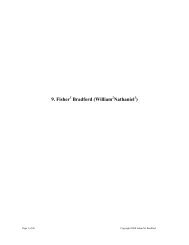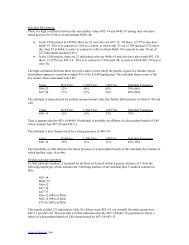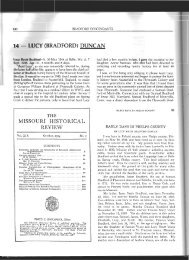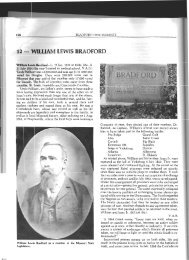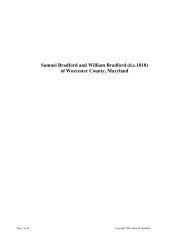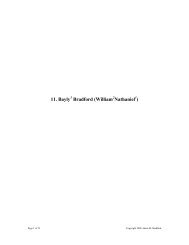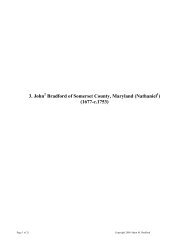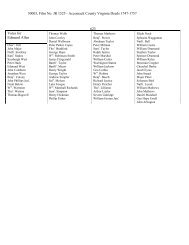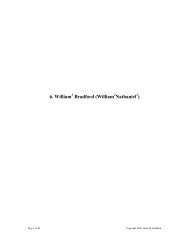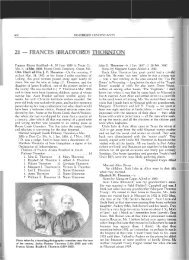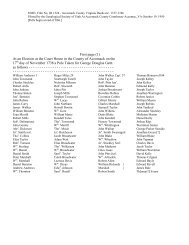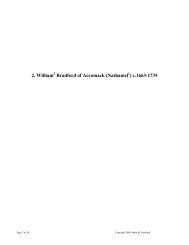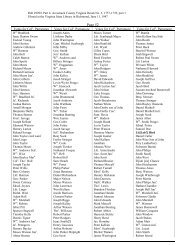1. Nathaniel Bradford of Accomack County, Virginia - Lower ...
1. Nathaniel Bradford of Accomack County, Virginia - Lower ...
1. Nathaniel Bradford of Accomack County, Virginia - Lower ...
Create successful ePaper yourself
Turn your PDF publications into a flip-book with our unique Google optimized e-Paper software.
noteworthy for the presence <strong>of</strong> another individual with the same surname as <strong>Nathaniel</strong>. There is no<br />
evidence <strong>of</strong> any relation, but the tone <strong>of</strong> brusque familiarity used by Henry when speaking <strong>of</strong> <strong>Nathaniel</strong><br />
(“give him his ear”) suggests the two may have been more than passing acquaintances.<br />
As for Henry himself, he appears in only one other record in <strong>Accomack</strong> <strong>County</strong>. On 18 April 1672 the<br />
Justices received a note from Henry <strong>Bradford</strong> asserting that he had received 2 hogsheads <strong>of</strong> tobacco from<br />
John Reyny for the use <strong>of</strong> Thomas Smith by the appointment <strong>of</strong> Mr. Browne. 226 Henry <strong>Bradford</strong> probably<br />
did not live in <strong>Accomack</strong> <strong>County</strong>, since he appears on none <strong>of</strong> the tithable lists and since someone who was<br />
in the business <strong>of</strong> securing cargo for merchants and transporting servants would have shown up more in<br />
court had he been a resident.<br />
It is worth pointing out that a Henry <strong>Bradford</strong> appears in the 1625 muster <strong>of</strong> <strong>Virginia</strong>, taken just after the<br />
King took over direct rule <strong>of</strong> the colony. In the muster at James City a Henery <strong>Bradford</strong>, age 35, is listed as<br />
a servant <strong>of</strong> Capt. William Pierce. 227 He had been transported in the Abigaile along with fellow servant<br />
Thomas Smith, who was age 17 at the time <strong>of</strong> the muster. Henery <strong>of</strong> the muster can not be the same Henry<br />
who sold John Reeves to <strong>Nathaniel</strong>, since the former Henry passed away in 1628. 228<br />
* * * * *<br />
Bacon’s Rebellion<br />
On 20 February 1677, <strong>Nathaniel</strong> <strong>Bradford</strong> was paid 1500 lbs <strong>of</strong> tobacco by the <strong>Virginia</strong> Assembly as a<br />
“public charge,” that is, for services rendered to the government. 229 Though the record doesn’t reveal the<br />
nature <strong>of</strong> <strong>Nathaniel</strong>’s service, the timing <strong>of</strong> the payment makes it all but certain that <strong>Nathaniel</strong> was being<br />
compensated for services rendered to Governor Berkeley in his war against the rebel <strong>Nathaniel</strong> Bacon,<br />
which had taken place the previous year. On the same date, and on the same page in the records <strong>of</strong> the<br />
journals <strong>of</strong> the <strong>Virginia</strong> House <strong>of</strong> Burgesses, numerous other men from the eastern shore were paid for<br />
“public charge.” Many men from the eastern shore assisted the Governor during his stay there in flight<br />
from the rebellion on the western shore and in Berkeley’s later invasion and recapture <strong>of</strong> Jamestown. In<br />
<strong>Accomack</strong> court during the year following the rebellion dozens <strong>of</strong> men came forward to claim a certificate<br />
for tobacco or goods due them for “country’s service.” These individuals had assisted in a variety <strong>of</strong> ways:<br />
John Charles for grinding corn for wounded soldiers; 230 John Stratton for volunteering his vessels for use<br />
by the invasion force and Captain <strong>Nathaniel</strong> Walker for commanding Stratton’s vessels; 231 John Sturgis for<br />
46 lbs <strong>of</strong> butter and 42 lbs <strong>of</strong> cheese; 232 John Cropper for impressing beef; 233 Thomas Evans for guarding<br />
prisoners; 234 Richard Piwell for “getting and killing meat” for the force assembled by Major West; 235<br />
Christopher Thompson for his own and his horse’s service for 14 days; 236 Thomas Barret for 33 days <strong>of</strong><br />
military service in West’s force; 237 William Chace for 30 days <strong>of</strong> military service in a force assembled by<br />
Southy Whittington. 238 These men all came forward to swear to their service in <strong>Accomack</strong> Court because<br />
they had yet to receive compensation for their efforts from the Assembly, and these records reveal the<br />
nature <strong>of</strong> their service. Since <strong>Nathaniel</strong> <strong>Bradford</strong> was paid by the assembly without a petition, it’s<br />
impossible to say precisely how he assisted the governor’s cause.<br />
To some extent the rebellion’s beginnings lay in the discontent <strong>of</strong> many <strong>Virginia</strong>ns with the colonial<br />
government, but historians differ over how much weight should be assigned to any single root cause <strong>of</strong><br />
discontent. <strong>Virginia</strong> had fallen on tough times economically, and this had much to do with the grievances <strong>of</strong><br />
the colonists. Tobacco, <strong>Virginia</strong>’s staple crop and the economic lifeblood <strong>of</strong> the colony, had suffered a loss<br />
in price since 1660 and many blamed it on the monopoly on the American commodities trade granted to<br />
English merchants by the Navigation Act <strong>of</strong> that year. The convergence <strong>of</strong> high fees levied on America’s<br />
exported goods with the rising cost <strong>of</strong> imported goods seemed to put a brake on the colony’s economic<br />
expansion. As if that weren’t bad enough, Indian incursions on the western frontier in 1675 and the<br />
inability <strong>of</strong> the colonial government to prevent the Dutch from burning <strong>Virginia</strong>’s tobacco fleet in 1673 lent<br />
another dimension to the anxiety already felt over the colony’s economic insecurity. Add to these<br />
grievances a level <strong>of</strong> taxation that was seen as both too high and misapplied as well as a resentment that, as<br />
Bacon wrote, “all the power and sway is got into the hands <strong>of</strong> the rich,” 239 and it may be readily imagined<br />
how by 1675 <strong>Virginia</strong> was filled with discontent, which in the following year exploded into a full-scale<br />
rebellion against Government authority.<br />
The spark which eventually ignited the <strong>Virginia</strong>ns’ smoldering discontent was provided in 1675 when a<br />
group <strong>of</strong> Doeg Indians conducted a raid on Thomas Mathews’ plantation near the Potomac River. The raid<br />
may not have been a simple matter <strong>of</strong> plunder, but rather might have been intended as punishment over<br />
Page 40 <strong>of</strong> 74 Copyright 2008 Adam M. <strong>Bradford</strong>



